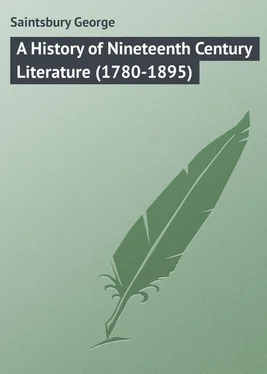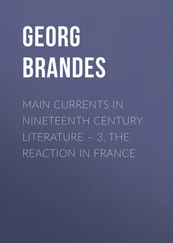George Saintsbury - A History of Nineteenth Century Literature (1780-1895)
Здесь есть возможность читать онлайн «George Saintsbury - A History of Nineteenth Century Literature (1780-1895)» — ознакомительный отрывок электронной книги совершенно бесплатно, а после прочтения отрывка купить полную версию. В некоторых случаях можно слушать аудио, скачать через торрент в формате fb2 и присутствует краткое содержание. ISBN: , Жанр: foreign_prose, на английском языке. Описание произведения, (предисловие) а так же отзывы посетителей доступны на портале библиотеки ЛибКат.
- Название:A History of Nineteenth Century Literature (1780-1895)
- Автор:
- Жанр:
- Год:неизвестен
- ISBN:http://www.gutenberg.org/ebooks/31698
- Рейтинг книги:5 / 5. Голосов: 1
-
Избранное:Добавить в избранное
- Отзывы:
-
Ваша оценка:
- 100
- 1
- 2
- 3
- 4
- 5
A History of Nineteenth Century Literature (1780-1895): краткое содержание, описание и аннотация
Предлагаем к чтению аннотацию, описание, краткое содержание или предисловие (зависит от того, что написал сам автор книги «A History of Nineteenth Century Literature (1780-1895)»). Если вы не нашли необходимую информацию о книге — напишите в комментариях, мы постараемся отыскать её.
A History of Nineteenth Century Literature (1780-1895) — читать онлайн ознакомительный отрывок
Ниже представлен текст книги, разбитый по страницам. Система сохранения места последней прочитанной страницы, позволяет с удобством читать онлайн бесплатно книгу «A History of Nineteenth Century Literature (1780-1895)», без необходимости каждый раз заново искать на чём Вы остановились. Поставьте закладку, и сможете в любой момент перейти на страницу, на которой закончили чтение.
Интервал:
Закладка:
We have already glanced at the way in which Cowper applied it in his larger poems: he did it equally well, and perhaps more tellingly, in his smaller. The day on which a poet of no mean pretensions, one belonging altogether to the upper classes of English society, and one whose lack of university education mattered the less because the universities were just then at their nadir, dared to write of the snake he killed was an epoch-making day. Swift would have done it; but Swift was in many ways a voice crying in the wilderness, and Swift was not, strictly speaking, a poet at all. Byrom would have done it; but Byrom was emphatically a minor poet. Cowper could – at least in and for his day – boast the major afflatus, and Cowper did not disdain vernacular truth. He never could have been vulgar; there is not in the whole range of English literature quite such a gentleman in his own way as Cowper. But he has escaped almost entirely from the genteel style – from the notion of things as below the dignity of literature.
"And taught him never to come there no more"
His prose in this respect is at least equal to his verse, though, as it was known much later, it has greater tendency than influence. All good critics have agreed that his letters are not surpassed, perhaps not surpassable. He has more freedom than Gray; he has none of the coxcombry of Walpole and Byron; and there is no fifth name that can be put even into competition with him. Ease, correctness, facility of expression, freedom from convention within his range, harmony, truth to nature, truth to art: – these things meet in the hapless recluse of Olney as they had not met for a century – perhaps as they had never met – in English epistles. The one thing that he wanted was strength: as his madness was melancholy, not raving, so was his sanity mild but not triumphant.
George Crabbe was three and twenty years younger than Cowper, having been born on Christmas Eve 1754. But his first publication, The Library , the success of which was due to the generous and quick-sighted patronage of Burke after the poet had wrestled with a hard youth, coincided almost exactly with the first appearance of Cowper, and indeed a little anticipated it. The Village appeared in 1783, and The Newspaper in 1785, and then Crabbe (who had taken orders, had been instituted to livings in the East of England, and had married, after a long engagement, his first love) was silent for two and twenty years. He began again in 1807 with The Parish Register . The Borough , his greatest work, appeared in 1810. Shifting from the East of England to the West in 1813, he spent the last twenty years of his long life at Trowbridge in Wiltshire, and died in 1832 at the age of seventy-eight.
The external (and, as will be presently remarked, something more than the external) uniformity of his work is great, and its external conformity to the traditions and expectations of the time at which it first appeared is almost greater. A hasty judgment, and even one which, though not hasty, is not very keen-sighted, might see little difference between Crabbe and any poet from Pope to Goldsmith except the innovators. He is all but constant to the heroic couplet – the Spenserian introduction to The Birth of Flattery , the variously-grouped octosyllabic quatrains of Reflections , Sir Eustace Grey , The Hall of Justice , and Woman , with a few other deviations, being merely islets among a wide sea of rhymed decasyllabics constituting at least nineteen-twentieths of the poet's outpouring. Moreover, he was as a rule constant, not merely to the couplet, but to what has been called the "shut" couplet – the couplet more or less rigidly confined to itself, and not overlapping. But he did sometimes overlap, and either in fealty to Dryden, or from a secret feeling of the craving for freedom which his more lawless contemporaries expressed in other ways, he reverted to the Drydenian triplet and Alexandrine on which Pope had frowned. In Crabbe's couplet, too, there is something which distinguishes it from almost all others. This something varies very much in appeal. It is sometimes, nay, too often, a rather ludicrous something, possessing a sort of awkward prosaic "flop," which is excellently caricatured in Rejected Addresses . But it always shows signs of a desire to throw the emphasis with more variation than the icy uniformity of the Popian cadence admitted; and it is sometimes curiously effective.
Crabbe's position, independently of the strange gap in his publication (which has been variously accounted for), is not a little singular. The greater and the better part of his work was composed when the Romantic revival was in full swing, but it shows little or no trace of the influence of that revival in versification or diction. His earliest attempts do indeed show the same reaction from Pope to Dryden (of whom we know that he was an eager student) which is visible in Cowper and Churchill; and throughout his work, both earlier and later, there is a ruthless discarding of conventional imagery and a stern attention to the realities of scenery and character. But Crabbe has none of the Grace of the new dispensation, if he has some glimpses of its Law. He sails so close to the wind of poetry that he is sometimes merely prosaic and often nearly so. His conception of life is anti-idealist almost to pessimism, and he has no fancy. The "jewels five words long" are not his: indeed there clung to him a certain obscurity of expression which Johnson is said to have good-naturedly smoothed out in his first work to some extent, but from which he never got quite free. The extravagances as well as the graces of the new poetry were quite alien from him; its exotic tastes touched him not; its love for antiquity (though he knew old English poetry by no means ill) seems to have left him wholly cold. The anxieties and sufferings of lower and middle-class life, the "natural death of love" (which, there seems some reason to fear, he had experienced), the common English country scenery and society of his time – these were his subjects, and he dealt with them in a fashion the mastery of which is to this day a joy to all competent readers. No writer of his time had an influence which so made for truth pure and simple, yet not untouched by the necessary "disprosing" processes of art. For Crabbe is not a mere realist; and whoso considers him as such has not apprehended him. But he was a realist to this extent, that he always went to the model and never to the pattern-drawing on the Academy walls. And that was what his time needed. His general characteristics are extremely uniform: even the external shape and internal subject-matter of his poems are almost confined to the shape and matter of the verse-tale. He need not, and indeed cannot, in a book like this, be dealt with at much length. But he is a very great writer, and a most important figure at this turning-point of English literature.
Yet, however one may sympathise with Cowper, however much one may admire Crabbe, it is difficult for any true lover of poetry not to feel the sense of a "Pisgah sight," and something more, of the promised land of poetry, in passing from these writers to William Blake and Robert Burns. Here there is no more allowance necessary, except in the first case for imperfection of accomplishment, in the second for shortness of life and comparative narrowness of range. The quality and opportuneness of poetry are in each case undeniable. Since the deaths of Herrick and Vaughan, England had not seen any one who had the finer lyrical gifts of the poet as Blake had them. Since the death of Dunbar, Scotland had not seen such strength and intensity of poetic genius (joined in this case to a gift of melody which Dunbar never had) as were shown by Burns. There was scarcely more than a twelvemonth between their births; for Blake was born in 1757 (the day appears not to be known), and Burns in January 1759. But Blake long outlived Burns, and did not die till 1828, while Burns was no more in July 1796. Neither the long life nor the short one provided any events which demand chronicling here. Both poets were rather fortunate in their wives, though Blake clave to Catherine Boucher more constantly than Burns to his Jean. Neither was well provided with this world's goods; Burns wearing out his short life in difficulties as farmer and as excise-man, while all the piety of biographers has left it something of a mystery how Blake got through his long life with no better resources than a few very poorly paid private commissions for his works of design, the sale of his hand-made books of poetry and prophecy, and such occasional employment in engraving as his unconventional style and his still more unconventional habits and temper allowed him to accept or to keep. In some respects the two were different enough according to commonplace standards, less so perhaps according to others. The forty years of Burns, and the more than seventy of Blake, were equally passed in a rapture; but morality has less quarrel with Blake, who was essentially a "God-intoxicated man" and spent his life in one long dream of art and prophecy, than with Burns, who was generally in love, and not unfrequently in liquor. But we need no more either of antithesis or of comparison: the purely literary matter calls us.
Читать дальшеИнтервал:
Закладка:
Похожие книги на «A History of Nineteenth Century Literature (1780-1895)»
Представляем Вашему вниманию похожие книги на «A History of Nineteenth Century Literature (1780-1895)» списком для выбора. Мы отобрали схожую по названию и смыслу литературу в надежде предоставить читателям больше вариантов отыскать новые, интересные, ещё непрочитанные произведения.
Обсуждение, отзывы о книге «A History of Nineteenth Century Literature (1780-1895)» и просто собственные мнения читателей. Оставьте ваши комментарии, напишите, что Вы думаете о произведении, его смысле или главных героях. Укажите что конкретно понравилось, а что нет, и почему Вы так считаете.












